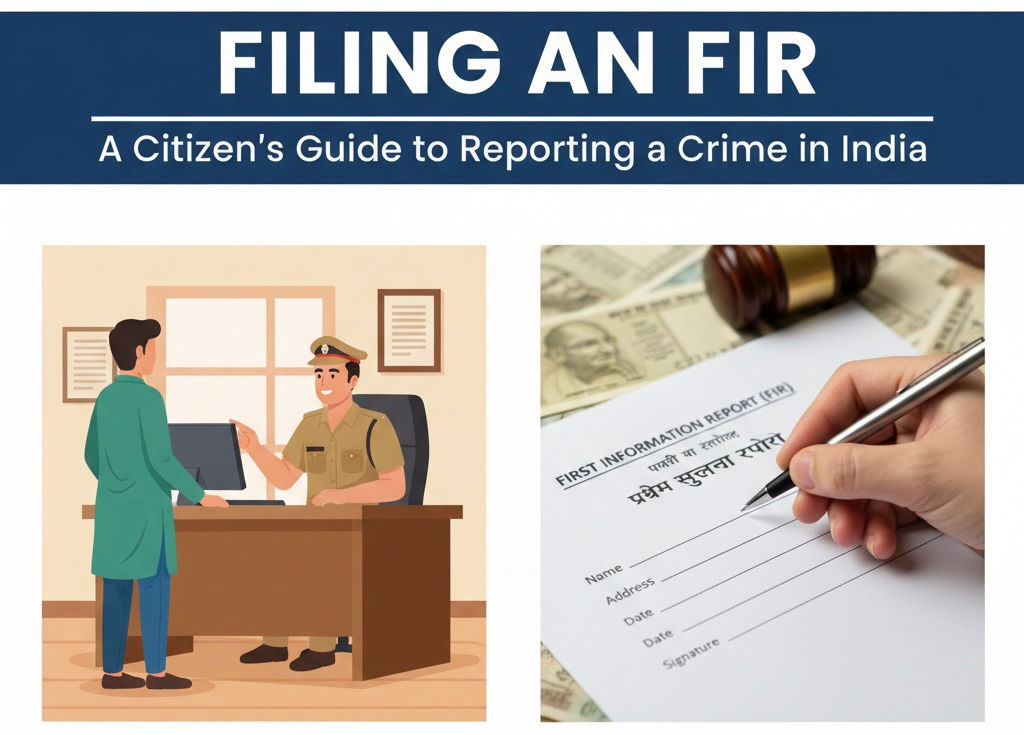
Filing an FIR: A Citizen's Guide to Reporting a Crime in India
- Yash Patel
- Sep 14, 2025
- 4 min read
Witnessing or being a victim of a crime can be a deeply distressing and confusing experience. In the chaos that follows, understanding the first crucial step towards justice is paramount. That step is filing a First Information Report, or FIR. While the process might seem intimidating, it is your fundamental right and the bedrock of the criminal justice system in India.
An informed citizen is an empowered citizen. This guide will demystify the process of filing an FIR, explain what you should expect, and highlight your rights every step of the way.
What Exactly is an FIR?
An FIR is a written document prepared by the police when they receive information about the commission of a cognizable offense.
• Cognizable Offense: This refers to a serious crime (like theft, robbery, assault, murder) where the police can arrest a suspect without a warrant and have the authority to start an investigation on their own.
The FIR, as registered under Section 154 of the Code of Criminal Procedure (CrPC), 1973, is the first official document that sets the process of criminal justice in motion. It is not evidence of guilt but the formal starting point of a police investigation.
Step-by-Step: How to File an FIR
Step 1: Approach the Right Police Station
Go to the police station that has jurisdiction over the area where the crime was committed. If you are unsure, you can go to any police station. They are legally obligated to register a "Zero FIR" and transfer it to the appropriate station.
Step 2: State the Facts Clearly
Approach the Officer in Charge (often an Inspector or Sub-Inspector) and narrate the incident. The information can be given orally or in writing.
Provide a clear, chronological account of what happened. Include crucial details such as:
• Date and Time of the incident.
• Location where it occurred.
• Sequence of events as they happened.
• Description of the people involved (accused and witnesses).
• Details of any property stolen or damage caused.
• What was said, what injuries were sustained, etc.
Stick to the facts you know. Do not speculate or make accusations without basis.
Step 3: The Police Will Record Your Statement
The police officer will write down your statement as you narrate it. The law requires that this information be recorded verbatim, in your own words.
Step 4: Review and Sign the Report
This is a critical step. The officer is required by law to read the recorded statement back to you.
• Listen carefully and read it yourself.
• Ensure all the details you provided are recorded accurately and without any omissions or additions.
• Only once you are completely satisfied with the accuracy of the report, you should sign it.
Step 5: Obtain a Free Copy of the FIR
You have an absolute right to receive a copy of the FIR, free of cost. The copy will have the FIR number, date, and the stamp of the police station. This document is crucial for all future reference and follow-up.
Know Your Rights: You Are Protected
The law provides several rights to protect citizens during this process:
• It is Your Right to Register: A police officer cannot refuse to register an FIR for a cognizable offense. Doing so is a dereliction of duty and is punishable by law.
• The Right to a Zero FIR: If a crime occurs outside a police station's jurisdiction, they must still register a "Zero FIR" and transfer the case. You cannot be turned away.
• The Right to a Free Copy: As mentioned, you must be given a copy of the FIR immediately after it is filed.
• Special Provisions for Women: For certain offenses (like sexual assault), a woman has the right to have her statement recorded by a female police officer. She can also give her statement at her residence or a place of her convenience in the presence of a police officer.
• No Fees: There are absolutely no charges or fees for filing an FIR.
What if the Police Refuse to File Your FIR?
Unfortunately, this can happen. If a police officer refuses to register your FIR, you have the following legal remedies:
1. Approach a Senior Officer: You can meet a senior police officer, such as the Superintendent of Police (SP) or Deputy Commissioner of Police (DCP), and submit your complaint in writing.
2. Send a Written Complaint: You can send the substance of your complaint in writing and by registered post to the SP/DCP concerned. If they are satisfied that it discloses a cognizable offense, they will either investigate the case themselves or direct a subordinate officer to do so.
3. File a Complaint with the Magistrate: As a final resort, you can file a private complaint before the Judicial Magistrate under Section 156(3) of the CrPC. The Magistrate has the power to order the police to register an FIR and investigate the matter.
What Happens Next?
Once the FIR is filed, the police will begin their investigation. This may involve visiting the crime scene, collecting evidence, and questioning witnesses and suspects. They will keep you informed of major developments. The journey to justice can be long, but filing an FIR is the essential first step that makes all subsequent actions possible.
Navigating the legal system can be challenging. If you are facing difficulties in filing an FIR or need guidance on the next steps, do not hesitate to seek legal counsel.
Disclaimer: This blog post is for informational purposes only and does not constitute legal advice. You should consult with a qualified legal professional for advice tailored to your specific situation.




Comments